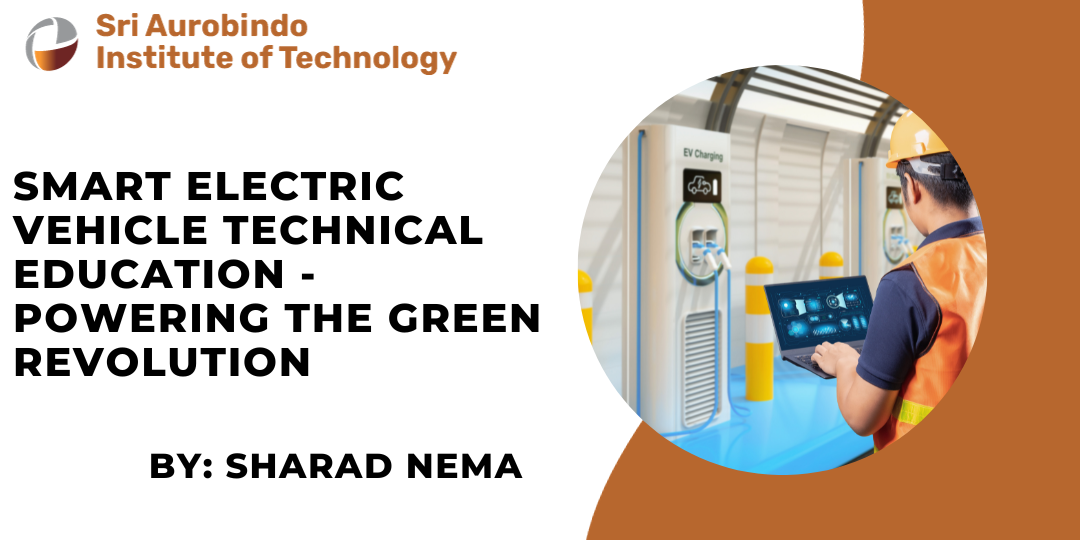Navigating The Path To Sustainable Waste Management - A Global Imperative
Waste management is a critical global issue that affects every facet of our lives, from public health and environmental preservation to economic...

The automotive sector is a major contributor to global carbon emissions. To mitigate the adverse effects of climate change, transitioning from traditional fossil fuel-powered vehicles to sustainable alternatives is paramount.
Hydrogen, the most abundant element in the universe, holds immense promise as a clean and sustainable energy source. When utilized as a fuel in engines, hydrogen offers the prospect of zero-emission transportation.
As mechanical and automobile engineering students, understanding the properties and potential of hydrogen is pivotal in embracing a sustainable future for the automotive industry and comprehending a shift towards sustainable energy.
In this blog, we will delve into the emerging field of hydrogen engines and their potential to revolutionize the mechanical and automobile engineering landscape. We will explore the working principles, advantages, challenges, and applications of hydrogen engines.
Hydrogen, the most abundant element in the universe, possesses unique properties that make it a promising fuel source for the future of sustainable energy, particularly in the field of mechanical and automobile engineering.
Hydrogen is known for its high energy content by weight, making it an excellent energy carrier. When burned or used in a fuel cell, it produces water vapor as the only direct byproduct, showcasing its potential as a clean and environmentally friendly fuel.
As a lightweight gas, hydrogen can be stored in various forms like gas, liquid, or solid, presenting versatility in storage and transportation.
In comparison to conventional fossil fuels, hydrogen stands out due to its clean combustion process, emitting zero carbon dioxide (CO2) and harmful pollutants.
Unlike fossil fuels, hydrogen is not limited by geological availability and can be produced sustainably using renewable energy sources, promising long-term energy security.
Environmental Benefits of Using Hydrogen as a Fuel
Utilizing hydrogen as a fuel significantly contributes to reducing greenhouse gas emissions, addressing one of the major challenges in combating climate change.
Its combustion or utilization in fuel cells produces no CO2, contributing to cleaner air and a healthier environment.
In context of mechanical and automobile engineering, this means the potential for creating vehicles with minimal environmental impact, aligning with the sustainability goals of the industry.

Hydrogen engines are at the forefront of clean energy propulsion, presenting an exciting alternative for a sustainable future. Two primary types of hydrogen engines are fuel cells and internal combustion engines.
Fuel cells use hydrogen and oxygen from the air to produce electricity through an electrochemical reaction. This electricity is used to power an electric motor, driving the vehicle.
Internal combustion engines, similar to traditional gasoline engines, combust hydrogen in the presence of air. The high-temperature combustion produces mechanical energy that drives the vehicle.

For fuel cells, essential components include the anode, cathode, and electrolyte. The anode separates hydrogen into protons and electrons, with protons passing through the electrolyte to the cathode. Meanwhile, electrons create an electric current that powers the vehicle's motor.
In internal combustion engines, hydrogen is stored in high-pressure tanks and injected into the engine. The combustion process converts hydrogen's chemical energy into mechanical energy, driving the pistons and ultimately the vehicle.
Hydrogen engines represent a promising leap forward in the field of mechanical and automobile engineering, offering a spectrum of advantages that position them as a viable alternative to conventional fossil fuel-based engines.
Hydrogen engines are characterized by their zero-emission nature, making them a pivotal solution in combating environmental concerns.
When hydrogen combusts within the engine, the only byproduct is water vapor, effectively eliminating harmful emissions such as carbon dioxide, nitrogen oxides, and particulate matter.
This feature is pivotal in reducing the carbon footprint of the transportation sector and contributing to cleaner air and a healthier environment.
Hydrogen engines are highly efficient in converting stored hydrogen into mechanical energy, yielding a superior power-to-weight ratio compared to traditional internal combustion engines.
This efficiency translates into better vehicle performance, with hydrogen engines often delivering more power for the same weight as traditional engines.
The enhanced power-to-weight ratio is particularly crucial for applications where weight and space are critical factors, such as aircraft and compact vehicles.

By harnessing hydrogen as a fuel source, we have the potential to significantly reduce greenhouse gas emissions.
Hydrogen production from renewable sources, like electrolysis powered by solar or wind energy, creates a cycle of clean energy. When hydrogen is utilized in engines, it acts as an energy carrier, emitting no greenhouse gases during operation.
The advancement of hydrogen production technologies and the integration of hydrogen engines into various sectors hold promise for a sustainable future with reduced reliance on fossil fuels and minimized environmental impact.
While the benefits might seem fascinating at first, there are still a few challenges that need to be addressed before we completely start shifting to hydrogen power.
The widespread adoption of hydrogen engines faces significant infrastructure challenges, particularly in hydrogen production, storage, and distribution. Hydrogen production requires efficient methods such as electrolysis or steam methane reforming.
Electrolysis, while clean, demands substantial electrical energy. Enhancing the efficiency of these processes and ensuring a sustainable energy source for production are critical challenges.
Additionally, safe and efficient storage and transportation methods for hydrogen are crucial. Hydrogen is a highly flammable gas and needs specialized storage solutions to maintain safety and maximize energy density.
Research focuses on advancements like solid-state hydrogen storage and novel compression techniques to overcome these challenges.
Efficiency and cost-effectiveness are paramount concerns in the development of hydrogen engines. Hydrogen fuel cells and combustion engines must achieve competitive efficiencies to match or surpass traditional combustion engines.
Improving catalysts, electrode materials, and overall system design are ongoing efforts to enhance the efficiency of hydrogen fuel cells.
Cost reduction is equally vital for widespread adoption. Economies of scale, innovation in manufacturing processes, and efficient resource utilization are key strategies in tackling this challenge.
The field of hydrogen engine technology is rapidly evolving, driven by intensive research and innovation. Engineers and researchers are continuously exploring novel materials, advanced manufacturing techniques, and optimized system designs to enhance hydrogen engine efficiency and performance.
Innovative solutions such as integrating hydrogen production with renewable sources and exploring alternative hydrogen carriers are being actively pursued.
Collaborations between academia and industry are crucial in promoting cross-disciplinary research and driving the hydrogen engine revolution forward.
By nurturing a culture of innovation and knowledge sharing, the engineering community can accelerate the development and deployment of hydrogen engine technology, contributing to a sustainable future in the automotive industry.

Hydrogen engines have a great scope in terms of applications and uses in the coming future.
Hydrogen engines present a paradigm shift in the automotive industry, offering a sustainable and eco-friendly alternative to conventional internal combustion engines.
In hydrogen-powered vehicles, hydrogen gas is converted into electricity through a fuel cell to power an electric motor, emitting only water vapor as a byproduct.
This technology overcomes the limitations of battery-powered electric vehicles, providing longer driving ranges and shorted refueling times.
Hydrogen-powered vehicles offer numerous advantages, making them a promising solution for a sustainable future.
Hydrogen fuel cells can be highly efficient, converting a high percentage of the fuel's energy into electricity, resulting in better fuel economy.
Additionally, hydrogen fuel is lighter and can be stored in tanks, making it suitable for various vehicle types. Engineers in this field focus on optimizing the fuel cell system, ensuring durability, efficiency, and safety.
Through research, development, engineering students pave the way for a cleaner and more sustainable mode of transportation, contributing to a healthier planet.
Beyond the automotive industry, hydrogen holds immense potential for various sectors.
In aerospace, hydrogen-powered engines can significantly reduce the environmental impact of air travel, making long-haul flights more sustainable.
Moreover, in maritime transportation, hydrogen fuel cells can power ships, offering an alternative to traditional fossil fuel-powered engines.
In recent years, hydrogen engines have gained traction in the automotive sector, exemplifying a paradigm shift towards sustainable transportation.
Toyota's Mirai, a hydrogen fuel cell vehicle, stands as a prime example. The Mirai employs fuel cell technology to convery hydrogen into electricity, powering an electric motor to drive the vehicle. This approach yields zero emissions at the point of use, emitting only water vapor.
Moreover, Hyundai's Nexo, another noteworthy case, showcases the versatility of hydrogen. The Nexo is a fuel cell electric SUV that not only produces zero tailpipe emissions but also offers impressive driving range and refueling convenience.
These advancements illustrate the potential of hydrogen engines in providing practical and eco-friendly solutions for future automotive technologies.
The future for hydrogen engines in the realm of mechanical and automobile engineering appears promising. As the world collectively seeks sustainable energy solutions, hydrogen emerges as a frontrunner due to its clear-burning properties and potential for mass production.
Hydrogen engines offer the advantage of zero emissions, making them a critical player in the fight against climate change. With ongoing advancements in hydrogen fuel cell technology, we can anticipate enhanced efficiency, increased power output, and improved durability of hydrogen-powered vehicles. The automotive sector is likely to witness a surge in hydrogen-powered vehicles, providing a greener alternative for a cleaner environment.

Waste management is a critical global issue that affects every facet of our lives, from public health and environmental preservation to economic...

The automotive landscape is witnessing an unprecedented shift, with electric vehicles (EVs) heralding a new era of sustainable transportation.

The Foundation of Modern Building Concrete is the backbone of modern construction, playing a pivotal role in shaping our urban landscapes. Its...